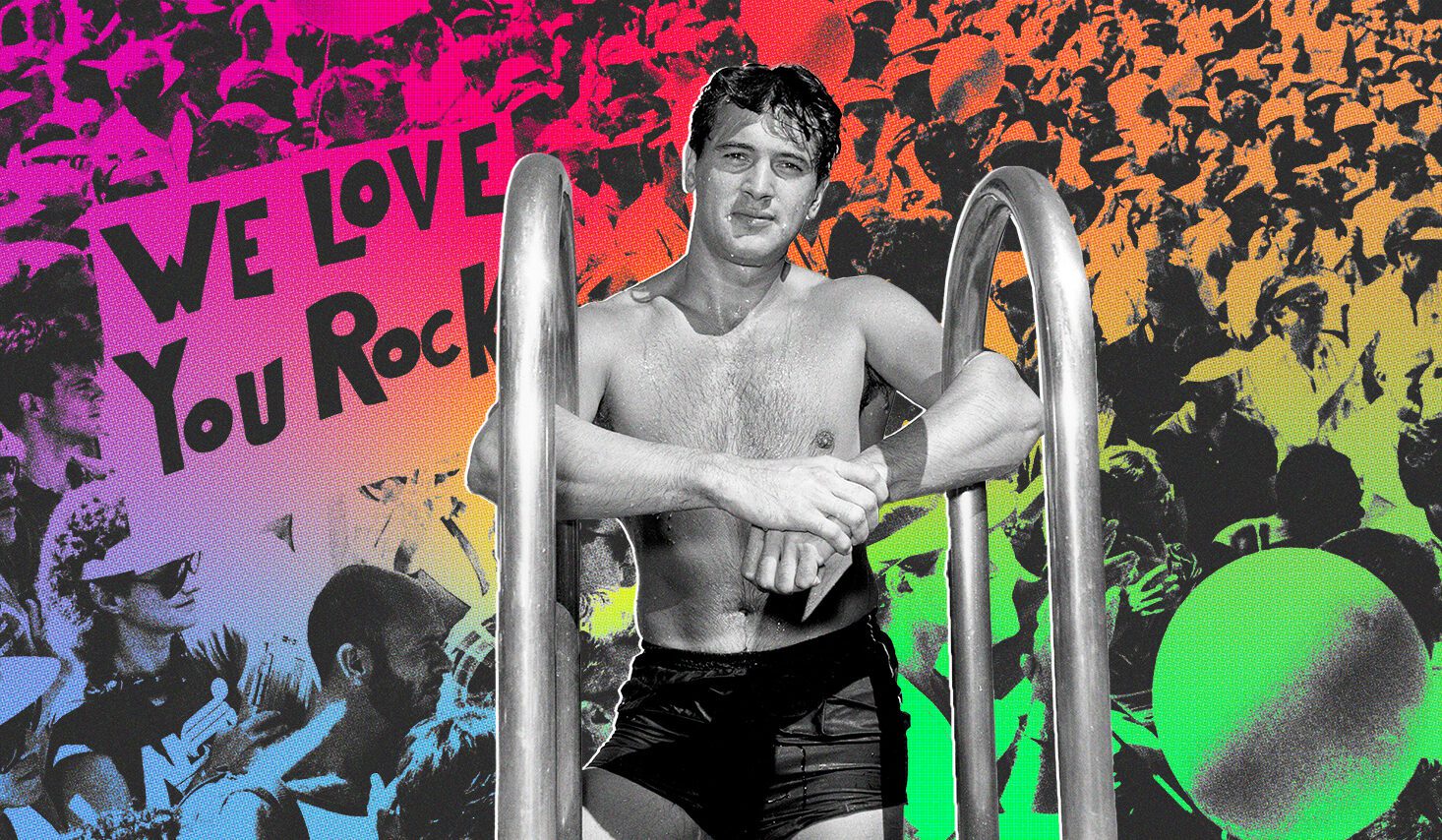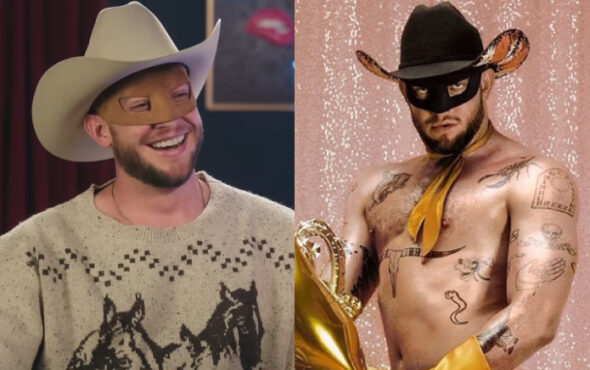
Decades before Noah Centineo and Nicholas Galitzine started enchanting tweens with their chiselled cheekbones, the Hollywood heartthrob of the day was an Illinois native by the name of Roy Harold Scherer Jr. – or, as you might know him, Rock Hudson.
Beloved for his all-American good looks and the mischievous glint in his eye, he smooth-talked his way through rom-coms with Doris Day to become one of the most popular actors of the 1950s and 1960s. As far as film studios were concerned, Hudson’s biggest asset was his sex appeal to female audiences. As a result of this and the prevailing homophobic attitudes of the day, the star’s agent Henry Willson went to great lengths to cover up Hudson’s queer identity, even spilling secrets about his other clients to the press in order to avoid the actor being outed in the papers.
However, there came a point where even Willson wasn’t able to stop the public speculation around Hudson’s personal life. After the actor made a television appearance in July 1985 – four years after the first HIV-symptomatic patients were identified in the US – looking gaunt, his health became the subject of national scrutiny. When he collapsed in a Paris hotel room shortly after, his French publicist ultimately confirmed that Hudson had been diagnosed with AIDS and details of his private life began to appear in the press. Hudson would ultimately pass away, aged 59, in October of the same year.
Now, almost four decades later, the documentary Rock Hudson: All That Heaven Allowed opens the door to uncovering what life was really like for the MGM star. Released in October, the film draws on interviews with the late actor’s friends and former lovers to build one of the most candid depictions we have of a star who unwittingly became an important touchstone for HIV awareness. Some of the film’s strongest moments examine the social and professional pressure Hudson and his team faced in order to keep his sexuality a secret – a topic which still feels uncomfortably resonant today.
Hudson came to fame in the pre-Stonewall years, an era when openly LGBTQIA+ figures were practically absent from the public eye and the Hays Code prohibited the depiction of so-called “perverse” subject matter – such as queer characters or sexuality – in Hollywood films. But even now, LGBTQIA+ actors have reported the ways that they were, implicitly or explicitly, advised to keep their identities a secret at the beginning of their careers.
This includes Fleabag and All of Us Strangers star Andrew Scott, who revealed in November that he was encouraged by industry figures he “really admired” to keep the fact he was gay under wraps when starting out in the entertainment industry. Similarly, Fellow Travellers star Jonathan Bailey has been open about the “shame” that is felt by gay men in the acting world and a culture where LGBTQIA+ individuals have been advised to remain quiet about their identities.
Figures such as Scott and Bailey are opening up conversations about the experience of LGBTQIA+ actors behind the scenes – and they aren’t the only ones. Actor Alan Turkington, who appears in Netflix’s Heartstopper as Mr Lange, explains that he also experienced pressure to hide his sexuality when he began acting in the early 2000s. “I was signed by one of the biggest agencies in the UK and my agent at the time said, ‘We can go one of two ways here. We can go down the gay route in which case your casting would be very limited, or…’ and they left a gap there as far as I can remember and I filled it in.”
Other actors who have spoken to GAY TIMES share similar experiences. Scott*, who is now a set designer and artist, left the acting profession as a result of homophobic attitudes on set. “When I was an actor, I played a leading role in a film and the producer eventually found out I was gay from the crew,” he recalls. “The producer then asked me if I was a ‘nice quiet gay’ or an ‘activisty gay’ and said she couldn’t have a gay lead. It was incredibly shaming.” The fallout from that interaction was far-reaching. “My agent said he didn’t want to know if I was gay. I found it pretty bleak, so I gave up the part because I needed to feel like I could be me. I couldn’t go back in the closet, it would’ve been devastating.”
When it comes to trans identities in the entertainment business, it can be even harder. Actors such as Elliot Page have been open about the pressures that trans individuals can come under to hide their identity. However, transmasculine actor Austin* doesn’t report being pressured into the closet. Rather, having already secured an ongoing television role before beginning gender-affirming treatment, they made the choice to not come out publicly about their transition.
This, they say, has helped to bypass negative attitudes from the public. “I personally was not prepared for the mental stress of being trans in the public eye, and I am honestly glad that the people I have worked with advised me very early on to keep my transition private, at least for now.” In particular, this separation between professional and private identities has helped Austin to feel safer online. “I really wouldn’t have been able to handle social media if I’d been more explicit about starting testosterone,” they add.
On-set, however, Austin remembers their body coming under scrutiny after they started taking testosterone. “My transition is something that the people I work with were not prepared for,” they say. In these instances, colleagues who have been willing to support and advocate for them have proved vital. “My friends at work stand up for me so well,” they continue. “I just need to find the confidence to be unapologetic about the fact that I’m trans: my being trans shouldn’t be an inconvenience or an issue to solve.”
Ultimately, conditions for LGBTQIA+ actors will only improve when more allies in the industry start heeding the calls for change. Turkington, for his part, believes that a more queer-positive shift is underway – partially due to casting directors who are more open to diverse talents. “One of the reasons cited in the past by casting directors is that there wasn’t a pool of queer talent to choose from. Of course, the answer to that was, ‘You’re not looking hard enough!’,” the actor recalls. “In general, the casting directors, producers, executives are so much better on this front now and it’s great to see young queer actors hit the ground running.”
It’s an important reminder of the fact that our quest for greater, more authentic LGBTQIA+ representation shouldn’t just be aimed at actors or celebrities. Instead, it’s the people behind the camera who determine the types of roles that queer individuals are deemed fit to play and create the workplace culture which allows diversity to either flourish or to wither out. While it’s hard not to notice the strides for representation that have been made since Hudson’s day, we need to continue pushing for an industry where queer people can thrive – rather than just survive – as their truest self.
*Names have been changed
Rock Hudson: All That Heaven Allowed is available to watch on digital platforms now.



